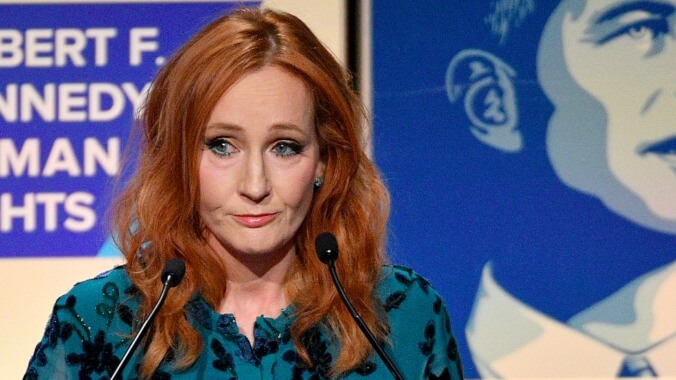J.K. Rowling is still talking

Following a torrent of fan criticism and a public rebuttal from none other than Harry Potter himself, Daniel Radcliffe, Harry Potter fans have been hoping for J.K. Rowling come to her senses. And the title of a new essay on her website, “J.K. Rowling Writes about Her Reasons for Speaking out on Sex and Gender Issues,” sounds like it might be reasonable—for a moment. Instead, it sees Rowling doubling down, and expanding on transphobic tweets she posted Saturday. “This isn’t an easy piece to write, for reasons that will shortly become clear, but I know it’s time to explain myself on an issue surrounded by toxicity. I write this without any desire to add to that toxicity,” the essay begins. If it’s not already clear, she failed.
Rowling explains that her “interest in trans issues” began long before her first public weigh-in on the issue last December, after a British woman named Maya Forstater lost her job for posting transphobic tweets. (Rowling puts quotation marks around the word, as if the tweets weren’t transphobic. They were.) But she writes that her “toxic” relationship with trans activists and allies began with an “accidental” like of a tweet that she was screen-grabbing “for research” and exploded after she started following Magdalen Burns, “a great believer in the importance of biological sex.” Rowling details her “cancellation” (her “fourth or fifth,” she notes) but then admits her transphobic thoughts were buoyed by an “avalanche of emails and letters that came showering down upon me, the overwhelming majority of which were positive, grateful and supportive.”
Empowered by that support, Rowling has apparently spent the past year further cementing her transphobic stance. She claims that she intentionally stepped away from Twitter for her “mental health” following the Burns backlash, but her critics returned with fervor when Rowling re-emerged on Twitter earlier this year. “Immediately, activists who clearly believe themselves to be good, kind and progressive people swarmed back into my timeline, assuming a right to police my speech, accuse me of hatred, call me misogynistic slurs and, above all – as every woman involved in this debate will know – TERF,” she writes. “‘TERF’ is an acronym coined by trans activists, which stands for Trans-Exclusionary Radical Feminist.”
Rather than listening to organizations like GLAAD—who has stated she is preaching “an ideology which willfully distorts facts about gender identity and people who are trans” and that “there is no excuse for targeting trans people in 2020”—Rowling has a different approach: making fun of them:
“Accusations of TERFery have been sufficient to intimidate many people, institutions and organisations I once admired, who’re cowering before the tactics of the playground. ‘They’ll call us transphobic!’ ‘They’ll say I hate trans people!’ What next, they’ll say you’ve got fleas? Speaking as a biological woman, a lot of people in positions of power really need to grow a pair (which is doubtless literally possible, according to the kind of people who argue that clownfish prove humans aren’t a dimorphic species).”
Then Rowling gets to it, pulling out the GOP’s beloved bathroom argument:
 Keep scrolling for more great stories.
Keep scrolling for more great stories.
